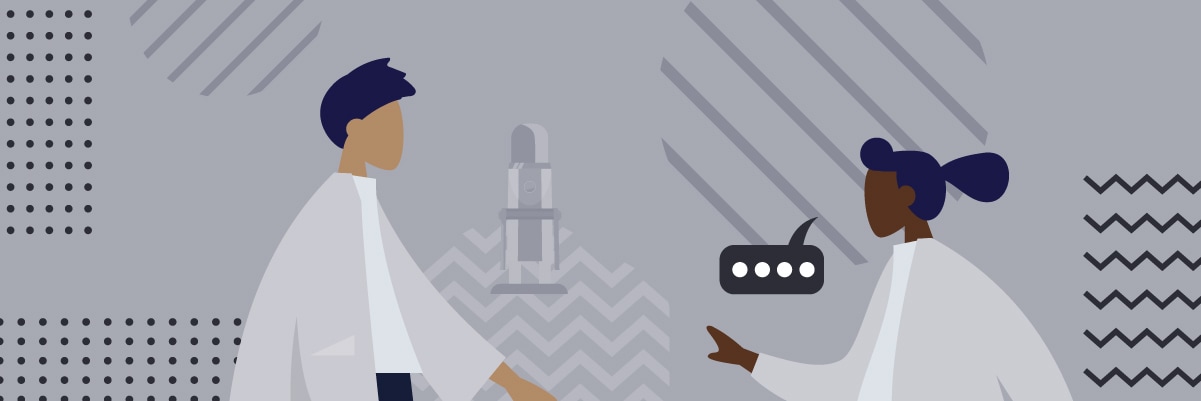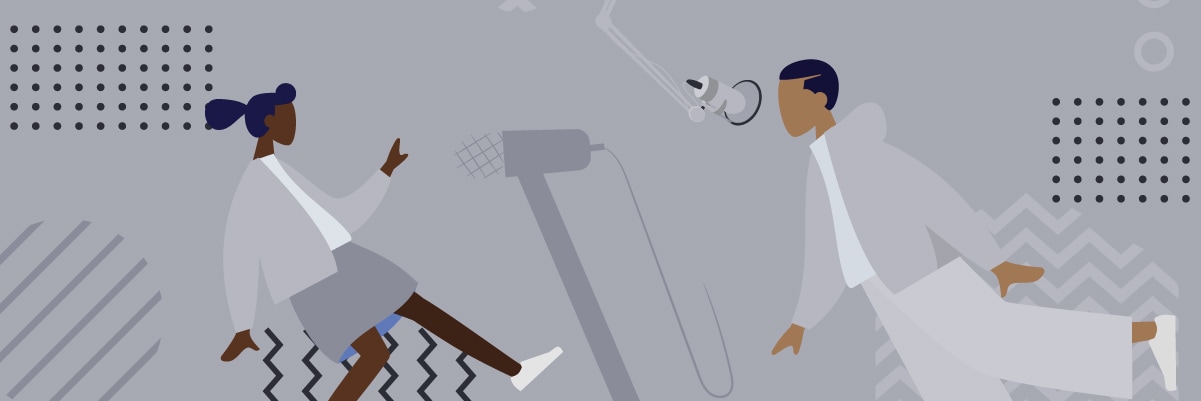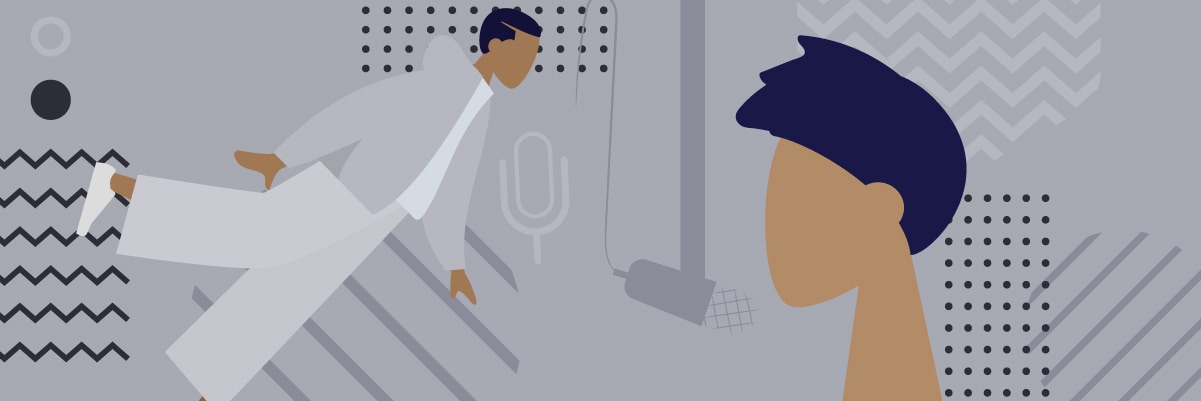Maybe you want to join the dubbing revolution. And no, I don’t mean dabbing, that’s a dance, and it looks ridiculous (#oldman). If you’re thinking about either hiring a voice artist or becoming one, you’re in luck. In this article, I aim to provide information about this lucrative, fun career, as well as where to find high-quality jobs — and make good hires.
Maybe you’ve got an amazing project that you need the right artist for. Or, perhaps, you’re one of ’em wandering voice freelancers, going from job to job in the desert of the internet. Regardless of whether you’re a modern-day dubbing Kung Fu master or looking for that one perfect voice, today we’ll learn all about dubbing.
- What it is, and why you need to get in on the action ASAP.
- How much does a dubbing artist make per year?
- What do you need to become — or spot — a good dubbing artist.
- Where to find voice dubbing jobs, and where to make hires that are worth your time.
Does this look like it’s right up your alley? It should be, because we’re in the midst of a tremendous, exponential job expansion in the area. And, even luckier for you, we’re at Bunny Studio, home of over 100,000 vocal pros. That means that if there’s anyone who knows their stuff, it’s us.
Let me take you on a small dubbing journey, and hopefully, we’ll reach enlightenment on the other end.
Voice Dubbing Jobs — What Are They About?
Perhaps you’re an experienced cinephile, TV show enthusiast, or both. Lord knows that the whole COVID-19 thing has given us plenty of time to put that Netflix subscription to good use. Well, perhaps you’re an Amazon or HBO Max person; it’s hard enough to keep track of subscription services as is. The thing is, you’ve probably been watching plenty of foreign TV shows, right? What’s the latest and greatest out there? Maybe Dark, or perhaps something like Elite or Money Heist.
Regardless of your preference of TV show, I’m going to make a prediction, and it’s not because I’m psychic:
You’ve been watching these shows with the audio in your native language. It’s made the foreign feel less so, and the action easier to follow. Perhaps, you haven’t even noticed.

That, my friend, is the magic of dubbing; the complete replacement of the original vocal track with another in a different language. Dubs aim to seamlessly create the illusion of the characters speaking in another tongue. Of course, you need talented voice actors and state-of-the-art audio engineering. After all, while dubbing is a form of voice-over, they’re not one and the same.
Voice-over and dubbing are both techniques for interpreting a message to a new audience. However, while voice-over is narrative by nature and lacks the emotion and tonality of the original audio, dubbing is much more precise as it maintains the tonal, emotive, and technical richness of the original soundtrack.
(…) When translating audio, dubbing attempts to hide the evidence of this translation so that foreign content appears native to the target audience. Dubbing is also called Language Replacement, and it creates the illusion that the actors on screen speak the native tongue of the viewers. Well-dubbed audio takes expertise, sounds natural, and the result is unnoticeable to the viewer.
Why It’s Blowing Up Right Now
Lo and behold, dubbing has sparked a revolution in how we consume media. Streaming platforms like Netflix can track extremely reliable metrics and user stats. What did they find?
- That people have been watching dubbed versions of shows much more than the subbed ones.
- Also, that dubbed content has been going up like crazy — sometimes more than 120% a year.
- Netflix is now employing over 125 facilities worldwide just to keep up with the demand for voice dubbing jobs.
- They used to dub in 24 languages, but that’s now up to 31 and rising!
And this global dubbing revolution is, no doubt, due to the desire for comfort. Dubs hit closer to home, and make the action easier to follow. Subs generally rely on people’s reading speed, and that varies a lot across the board. But dubs are more immersive for most, they’re the relaxed option that makes lounging on your couch all the more comfortable.
The result? We’ve gone from dubbing mostly anime, cartoons, or children’s shows, and applying it to everything. It’s become so big that we’ve now got veritable dubbing stars, artists who are recognized on the street, or becoming household names.
Most Popular Voice Dubbing Jobs
As per my previous article on the subject, here are some of the most popular voice dubbing jobs out there:
- Movies
- TV shows
- Animation (cartoons, anime, etc.)
- Web Content
- Social Media content
- YouTube videos
- Explainer Videos
- Corporate Media
Just think about it. You could potentially export any content you make in one language to others. If you’re looking to make an impact in new markets, dubbing is definitely something to consider.
And not all your voice hires need to be trained thespians. Sure, it definitely helps to have some experience with the performing arts, but it’s by no means a requirement. And you should also keep in mind that not all dubbing jobs are created equal; some require acting chops, and some just a nice narrator voice. This also applies if you’re thinking about getting into the profession.
You may be asking yourself “Do I have what it takes to go toe to toe with the dubbing greats?” But don’t. Voice dubbing is a much more accessible, newbie-friendly profession than what may initially appear. You can work your way up doing non-dramatic work, and then working on your strengths. Not every first job is a complete dubbing of Les Miserables, you know?
This doesn’t mean that there are no quality indicators for what makes a good dubbing artist.
Some Things to Look Out For
So, what are the hallmarks of a good dubbing artist? Here’s a checklist that’ll help you when landing — or hiring for — voice dubbing jobs.
The Ability to Blend In
Now, a great voice actor is not a scenery-chewer. Meaning, they know they’re not the real star of the show. Dubbing artists are like this, but they need to respect the cadence and tone of the original. They never attempt to one-up the original actor but to maintain a certain amount of coherency. What you don’t want is someone who doesn’t resemble the original voice actor at all and just makes the dub seem like a parody. And yes, this happens more than you’d think, unfortunately.
Good Gear
It’s safe to say that you won’t land good voice dubbing jobs without good gear. Conversely, you shouldn’t hire actors who seem like they’ve got a good voice but are recording inside of a tin can. With great microphones fetching for as low as $99 (the Blue Yeti USB, for example), there’s simply no excuse for a bad sound.
Always, always request samples from your voice artists. They should be able to provide them on a dime, and they should sound good, without extraneous sounds, coughs, or any interference. Errors just draw attention to themselves, and that’s something that absolutely shatters the suspension of disbelief. And I don’t have to tell you that such a thing is tantamount to abject failure in the world of dubbing.
Experience is Not a Must — Proof of Skill is
It’s OK to go out on a limb sometimes and hire pros that charge fair rates and are just getting started. But, you’ve always got to ask them for a way to prove they’ve got the goods. You may be tempted to take them at their word, but always demand samples before you sign any sort of contract or agreement. If they’ve proven they’ve got the right voice for the job, there’s no reason not to go ahead.
But, it’s always a pretty big risk to start with somebody with zero experience. See that they’ve at least got a few reviews under their belt. You don’t need someone who’s been doing this for ten years, but a proven ability to deliver can certainly put your mind at ease.
If you’re a pro just starting out, there’s always the option of doing a few small voice dubbing jobs “pro bono”, or recording a batch of samples that showcases your varied skills. Trust me: you won’t get anywhere without something to show your clients.

The Best Place to Find Voice Dubbing Jobs
Hey, the internet is rife with freelancing agencies and sites. There are plenty of places where to hire artists or look for voice dubbing jobs. But, platforms like Freelancer, Upwork, or PeoplePerHour usually have a pretty cumbersome hiring process. And, they’re not devoted to dubbing like specialized platforms are. Meaning, you’ll find all sorts there: from absolutely talented voice pros to people who are just starting out but don’t even know whether they’re OK at this or not.
My recommendation? Stick with Bunny Studio, and here are some reasons why:
- We’ve got an amazing roster of 100,000+ dubbing artists. And, our algorithm makes it super-easy to find the exact vocal type you’re looking for, plus plenty of samples to boot.
- It’s easy to get in and start getting voice dubbing jobs — provided you’ve got what it takes. Our selection process is not easy, but if you pass our test, you’ll find high-quality jobs coming your way in no time.
- If there’s one focus at Bunny Studio, it’s turnaround. Pros in other platforms typically meander and take a million years to finish a single job. Here, the typical turnaround time is under 12 hours, depending on the project’s length. We always make sure the material gets to you when you need it.
- And, we have a magnificent QA team at the ready that oversees every project. The finished material doesn’t get to your desk until we’ve given the go-ahead.
- Don’t like the result? You still get 100% of your money back and we pay the pro. Hey, if we’ve deemed their job good enough, they’ve gotsta get paid.
Sounds good? You’ll soon find that there’s no place like Bunny Studio anywhere else. If you’re ready, submit a project or take our test, and we’ll take care of the rest!











